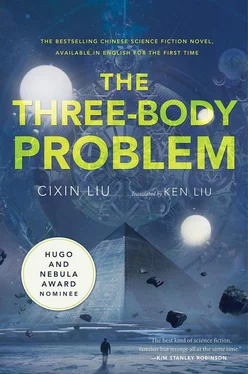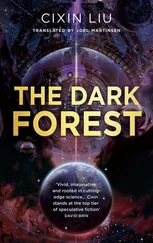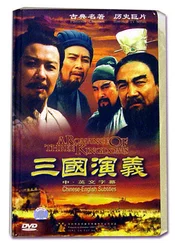Ye didn’t give up, though. In fact, as long as she didn’t take excessive risk, it wasn’t difficult to accomplish her goal. The Red Coast transmitter was ultra-high-powered, but all of its components were domestically produced during the Cultural Revolution. As the quality of the components was not up to par, the fault rate was very high. After every fifteenth transmission, the entire system had to be overhauled, and after each overhaul, there would be a test transmission. Few people attended these tests, and the targets and other parameters were arbitrarily selected.
One time when she was on duty, Ye was assigned to work during one of the test transmissions after an overhaul. Because a test transmission omitted many operational steps, only Ye and five others were present. Three of them were low-level operators who knew little about the principles behind the equipment. The remaining two were a technician and an engineer, both exhausted and not paying much attention after two days of overhaul work. Ye first adjusted the test transmission power to exceed the threshold value for her gain-reflective solar energy mirror theory, using the maximum power of the Red Coast transmission system. Then she set the frequency to the value most likely to be amplified by the energy mirror. And under the guise of testing the antenna’s mechanical components, she aimed it at the setting sun in the west. The content of the transmission remained the same as usual.
This was a clear afternoon in the autumn of 1971. Afterwards, Ye recalled the event many times but couldn’t remember any special feelings except anxiety, a desire for the transmission to be completed quickly. First, she was afraid to be discovered by her colleagues. Even though she had thought of some excuses, it was still unusual to use maximum power for a test transmission, because doing so would wear down the components. In addition, the Red Coast transmission system’s positioning equipment was never designed to be aimed at the sun. Ye could feel the eyepiece growing hot. If it burnt out she would be in real trouble.
As the sun set slowly in the west, Ye had to manually track it. The Red Coast antenna seemed like a giant sunflower at that moment, slowly turning to follow the descending sun. By the time the red light indicating transmission completion lit up, she was already soaked in sweat.
She glanced around. The three operators at the control panel were shutting down the equipment piece by piece in accordance with the instructions in the operating manual. The engineer was drinking a glass of water in a corner of the control room, and the technician was asleep in his chair. No matter how historians and writers later tried to portray the scene, the reality at the time was completely prosaic.
The transmission completed, Ye rushed out of the control room and dashed into Yang Weining’s office. Catching her breath, she said, “Tell the base station to begin monitoring the twelve thousand megahertz channel!”
“What are we receiving?” Chief Yang looked in surprise at Ye, strands of hair stuck to her sweaty face. Compared to the highly sensitive Red Coast monitoring system, the conventional military-grade radio—normally used by the base for communicating with the outside—was only a toy.
“Maybe we’ll get something. There’s no time to change the Red Coast systems to monitoring mode!” Normally, warming up and switching over to the monitoring system required a little more than ten minutes. But right now the monitoring system was also being overhauled. Many modules had been taken apart and remained unassembled, rendering them inoperable in the short term.
Yang stared at Ye for a few seconds, and then picked up the phone and ordered the communications office to follow Ye’s direction.
“Given the low sensitivity of that radio, we can probably only receive signals from extraterrestrials on the moon.”
“The signal comes from the sun,” Ye said. Outside the window, the sun’s edge was already approaching the mountains on the horizon, red as blood.
“You used Red Coast to send a signal to the sun?” Yang asked anxiously.
Ye nodded.
“Don’t tell anyone else. This must never happen again. Never!” Yang looked behind him to be sure there was no one at the door.
Ye nodded again.
“What’s the point? The echo wave must be extremely weak, far outside the sensitivity of a conventional radio.”
“No. If my guess is right, we should get an extremely strong echo. It will be more powerful than… I can hardly imagine. As long as the transmission power exceeds a certain threshold, the sun can amplify the signal a hundred million–fold.”
Yang looked at Ye strangely. Ye said nothing. They both waited in silence. Yang could clearly hear Ye’s breath and heartbeat. He hadn’t paid much attention to what she had said, but the feelings he had buried in his heart for many years resurfaced. He could only restrain himself, waiting.
Twenty minutes later, Yang picked up the phone, called the communications office, and asked a few simple questions.
He put the phone down. “They received nothing.”
Ye let out a long-held breath and eventually nodded.
“That American astronomer responded, though.” Yang took out a thick envelope covered with customs stamps and handed it to Ye. She tore the envelope open and scanned Harry Peterson’s letter. The letter said that he had not imagined that there would be colleagues in China studying planetary electromagnetism, and that he wished to collaborate and exchange more information in the future. He had also sent two stacks of paper: the complete record of the waveforms of the radio outbursts from Jupiter. They were clearly photocopied from the long signal recording tape, and would have to be pieced together.
Ye took the dozens of sheets of photocopier paper and started lining them up in two columns on the floor. Halfway through the effort she gave up any hope. She was very familiar with the waveforms of the interference from the two solar outages. They didn’t match these two.
Ye slowly picked up the photocopies from the floor. Yang crouched down to help her. When he handed the stack of paper to this woman he loved with all his heart, he saw her smile. The smile was so sad that his heart trembled.
“What’s wrong?” he asked, not realizing that he had never spoken to her so softly.
“Nothing. I’m just waking up from a dream.” Ye smiled again. She took the stack of photocopies and the envelope and left the office. She went back to her room, picked up her lunch box, and went to the cafeteria. Only mantou buns and pickles were left, and the cafeteria workers told her impatiently that they were closing. So she had no choice but to carry her lunch box outside and walk next to the lip of the cliff, where she sat down on the grass to chew the cold mantou .
The sun had already set. The Greater Khingan Mountains were gray and indistinct, just like Ye’s life. In this gray life, a dream appeared especially colorful and bright. But one always awoke from a dream, just like the sun—which, though it would rise again, brought no fresh hope. In that moment Ye saw the rest of her life suffused with an endless grayness. With tears in her eyes, she smiled again, and continued to chew the cold mantou .
Ye didn’t know that at that moment, the first cry that could be heard in space from civilization on Earth was already spreading out from the sun to the universe at the speed of light. A star-powered radio wave, like a majestic tide, had already crossed the orbit of Jupiter.
Right then, at the frequency of 12,000 MHz, the sun was the brightest star in the entire Milky Way.
The next eight years were among the most peaceful of Ye Wenjie’s life. The horror experienced during the Cultural Revolution gradually subsided, and she was finally able to relax a little. The Red Coast Project completed its testing and breaking-in phases, settling down into routine operation. Fewer and fewer technical problems remained, and both work and life became regular.
Читать дальше












